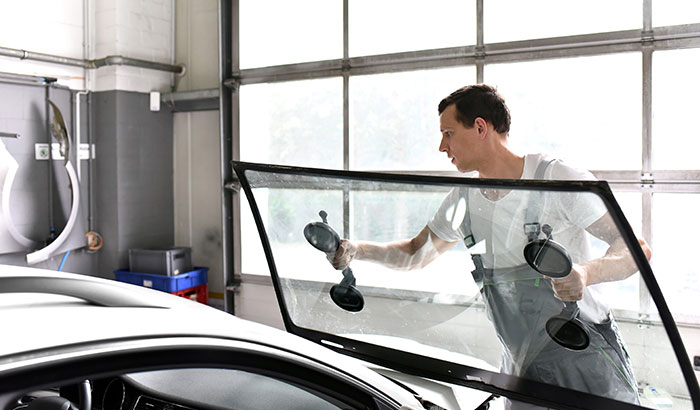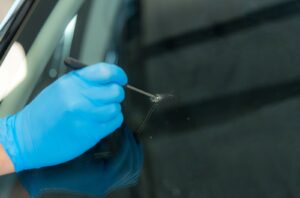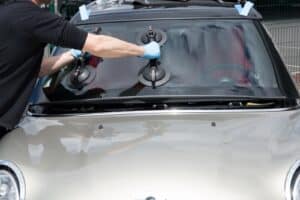There are no hard and fast rules about how often your vehicle may need a windshield repair or replacement. Generally, a windshield can last 5 to 15 years before needing a replacement. However, there are many reasons why you might need to replace your windshield sooner.
So, in this article, we will share the top reasons why you may need a windshield replacement, then we’ll take a gander at some of the facts about windshields that everyone should know about.
Let’s Get Started…
Reasons Why You May Need a Windshield Replacement
- Cracks or chips: Cracks or chips in your windshield are the most common reason for windshield replacement. Even small cracks or chips can compromise the windshield’s structural integrity and impair your visibility, making driving unsafe.
- Extreme weather conditions: Exposure to extreme weather conditions such as hail, heavy rain, and strong winds can cause damage to your windshield. In such cases, the windshield might need to be replaced to ensure driving safety.
- Wear and tear: As with any other part of your car, your windshield can wear out over time due to continuous use, which can lead to the need for a replacement.
- Damage from road debris: Driving on roads with loose gravel, stones, or debris can cause damage to your windshield, which might require replacement.
- Accidents: If you are involved in a collision, your windshield may need to be replaced, even if the damage is not immediately visible.
- Sun damage: Exposure to sunlight can cause the windshield to weaken and crack over time, making it necessary to replace the windshield.
- Aging: As your car ages, the windshield can become more brittle and prone to cracking, requiring a replacement.
- Poor installation: If your windshield was not installed properly in the first place, it might need a windshield repair, or it may need o be replaced sooner than expected.

- Manufacturing defects: If your windshield was manufactured with defects, it might crack or break more easily, requiring a replacement.
- Water damage: If water is allowed to seep into the edges of the windshield, it can cause the windshield to corrode and become damaged, leading to the need for replacement.
- Poor maintenance: If you don’t take care of your windshield by regularly cleaning and checking for damage, it can deteriorate quickly and require replacement.
- Environmental factors: Exposure to pollutants, such as acid rain and chemicals, can cause damage to your windshield, which might require replacement.
- Vibrations: Constant vibrations while driving can cause stress fractures in the windshield, leading to the need for replacement.
- Poor-quality glass: Using poor-quality glass for windshield replacements can lead to cracking and other damage, requiring a replacement.
- Vandalism: If someone intentionally damages your windshield, it might need to be replaced to ensure safety while driving.
- Insects and animals: Insects or animals colliding with your windshield can cause chips or cracks that may require a replacement.
- Incorrect cleaning methods: Using the wrong cleaning products or methods can damage your windshield, making it necessary to replace it.
- Inadequate repairs: If previous repairs to your windshield were not done correctly, the damage might worsen over time, leading to the need for replacement.
- Damage to the windshield wiper system: If your windshield wipers are not functioning correctly, they can scratch or damage your windshield, requiring a replacement.
- Vehicle modifications: Making changes to your vehicle, such as installing a sunroof or roof rack, can put added stress on the windshield, leading to the need for replacement.
- Exposure to extreme temperatures: Extreme temperatures, both hot and cold, can cause the windshield to expand and contract, leading to cracks and other damage that may require a replacement.
- Improper use of defrosting systems: Misusing defrosting systems can cause rapid temperature changes, leading to damage that may require replacement.
- Chemical exposure: Exposure to certain chemicals, such as cleaners or solvents, can cause damage to your windshield and require a replacement.
- Improper storage: Storing your car in an area with high humidity or extreme temperatures can cause damage to the windshield, leading to the need for a replacement.
- Poor driving habits: Poor driving habits such as tailgating, sudden braking, or hitting potholes can cause stress on the windshield and lead to cracks or chips that may require a replacement.
- Incorrect use of windshield washer fluid: Using the wrong type of windshield washer fluid can damage your windshield and lead to the need for a replacement.
- Exposure to ultraviolet (UV) rays: Exposure to UV rays can cause the windshield to become discolored and brittle over time, leading to the need for a replacement.
- Mechanical failure: If the windshield mechanism fails, the windshield may need to be replaced to ensure proper operation.
- Change in car usage: If you change how you use your car, such as using it for off-roading, towing, or heavy hauling, it can put added stress on the windshield and lead to the need for a replacement.
- Safety concerns: If your windshield is compromised in any way, it can be a safety hazard while driving, leading to a replacement to ensure your safety and the safety of others on the road.

So, as you can see, there are numerous reasons why you may need to replace your windshield. It’s important to keep an eye out for signs of damage and address them promptly to ensure your safety while driving. Regular maintenance, such as cleaning and inspection, can help prolong the life of your windshield and reduce the likelihood of replacement.
Now, let’s take a look at 13 facts about windshields that you may or may not know about:
- Windshields are designed to protect you: Windshields are an essential safety feature in your car, designed to protect you from road debris, weather conditions, and collisions. They are specifically designed to prevent objects from entering the cabin and to prevent passengers from being ejected in the event of a crash.
- They are made of two layers of glass: Most windshields are made of two layers of glass, sandwiching a layer of vinyl. The outer layer of glass is made of tempered glass, designed to be shatterproof, while the inner layer is made of laminated glass, designed to absorb impact and prevent the glass from shattering on impact. The vinyl layer acts as a bonding agent, holding the glass layers together.
- They are more than just a piece of glass: Windshields are a complex structure consisting of the glass itself, the frame, the sealant, and other components necessary for proper installation and operation. The windshield frame is typically made of metal or plastic and is a structural support for the glass. The sealant holds the windshield in place, preventing water and air from entering the cabin.
- They can become discolored: Exposure to UV rays can cause windshields to become discolored over time, affecting visibility and requiring a replacement. This is typically more of a cosmetic issue, but it can affect the resale value of your car.
- They can be tinted: Tinting your windshield can reduce glare and improve visibility, but it’s important to ensure the tinting meets legal requirements. In most states, the maximum allowable tint is 70% on the front windshield.
- They can be soundproofed: Some windshields are designed with additional soundproofing materials to reduce noise inside the car. This is achieved by adding a layer of acoustic film or other sound-dampening material to the windshield during production.
- They have different levels of strength: Different types of windshields have varying levels of strength, depending on the type of glass and the thickness of the layers. High-performance windshields are typically thicker and more impact-resistant than standard windshields.
- They are critical for airbag deployment: The windshield plays a crucial role in the deployment of airbags, which can save lives in the event of a collision. In some cars, the airbag sensor is located in the windshield, which allows the airbag to deploy at the correct angle and with the correct force.
- They require proper installation: Proper windshield installation is crucial for its proper function and to ensure your safety while driving. A poorly installed windshield can leak air and water, compromise your car’s structural integrity, and even pop out in the event of a collision.
- They can affect your car’s structural integrity: The windshield is an integral part of your car’s structure, and a damaged or improperly installed windshield can compromise your car’s structural integrity. In some vehicles, the windshield provides up to 60% of the car’s structural strength.
- They are subject to regulations: Windshields are subject to regulations regarding their design and construction, as well as their installation and repair. These regulations vary by state and country but are designed to ensure that windshields are safe and functional.
- They can be a target for thieves: Windshields can be a target for thieves, who may try to steal the VIN or other information from the windshield. This is more common with older cars, which may have VINs etched into the glass.
- They can impact your insurance rates: The cost of replacing a windshield can vary depending on the make and model of your car, as well as the extent of the damage. Depending on your insurance policy, you may be responsible for paying a deductible for windshield replacement or repair.
Additionally, some insurance companies offer special coverage for windshield damage, which can impact your insurance rates. It’s important to check with your insurance provider to see what coverage is available and what your options are.
Windshields are a critical safety feature in your car, and it’s important to understand their construction, function, and maintenance requirements. By keeping your windshield in good condition and properly maintaining it, you can ensure your safety and the safety of others on the road.
Utah Mobile Auto Glass
Whatever windshield issue you are facing, the best thing to do is leave windshield replacement or repairs to a professional, which is where Utah Mobile Auto Glass comes in.
We have trained technicians ready and willing to share their knowledge and expertise with you about alleviating your windshield woes. Contact us, and let’s replace your windshield today!









